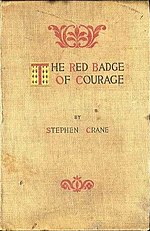Portal:Literature/Selected work/26
The Red Badge of Courage is a war novel by American author Stephen Crane. Taking place during the American Civil War, which concluded before Crane was born, the story is about a young private of the Union Army, Henry Fleming, who flees from the field of battle. Overcome with shame, he longs for a wound—a "red badge of courage"—to counteract his cowardice. When his regiment once again faces the enemy, Henry acts as standard-bearer.
The novel is known for its distinctive style, which includes realistic battle sequences as well as the repeated use of color imagery, and ironic tone. Separating itself from a traditional war narrative, Crane's story reflects the inner experience of its protagonist—a soldier fleeing from combat—rather than the external world around him. Also notable for its use of what Crane called a "psychological portrayal of fear", the novel's allegorical and symbolic qualities are often debated by critics. Several of the themes that the story explores are maturation, heroism, cowardice, and the indifference of nature. The Red Badge of Courage garnered widespread acclaim—what H. G. Wells called "an orgy of praise"—shortly after its publication, making Crane an instant celebrity at the age of twenty-four.

